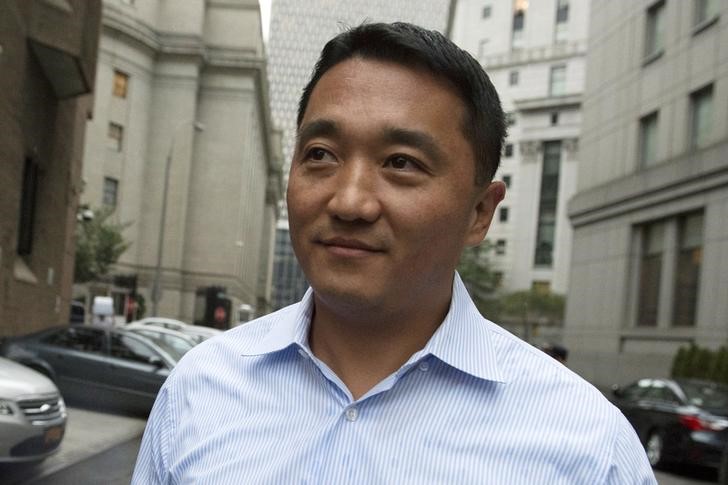By Jonathan Stempel
NEW YORK (Reuters) - U.S. prosecutors on Tuesday dropped their criminal case accusing Benjamin Wey of running a fraudulent stock manipulation scheme, after a federal judge threw out much of the evidence they hoped to use against the financier.
The dismissal was the government's second surrender in three weeks in a high-profile Wall Street case.
It followed prosecutors' July 21 decision to drop charges against two former JPMorgan Chase & Co (N:JPM) traders in the London Whale trading scandal.
The government had accused Wey in September 2015 of making tens of millions of dollars by secretly controlling large blocks of shares through "reverse mergers" between Chinese companies and U.S. shell companies, and selling his shares at artificially high levels.
But the case collapsed when U.S. District Judge Alison Nathan on June 13 ordered the "blanket suppression" of a huge cache of materials seized from Wey's home and offices, saying the broad search warrants violated the New York Global Group founder's constitutional rights.
Nathan said the seizure of items such as children's school records, family photos and X-rays at minimum reflected "grossly negligent or reckless disregard" of the Fourth Amendment.
The judge agreed on Tuesday to let prosecutors drop the Wey case, after they said it had been "based in significant part" on the seized materials and that "the government can no longer rely on that evidence at trial."
A spokesman for Acting U.S. Attorney Joon Kim in Manhattan, whose office handled the Wey and London Whale cases, declined to comment.
Wey has long maintained his innocence, including on his website, where he says " (t)he American spirit is about fighting back against tyranny. Never give in!"
He said in a statement provided by his law firm, Haynes and Boone, that "fabricated allegations and false statements" underlay the government's case, and the ordeal "devastated" employees and families.
"We are thankful that this judgment will help clear my name and hopeful that it protects other innocent citizens from the intrusion that we have endured," Wey said.
Wey was also in the news in June 2015, when a federal jury ordered him to pay $18 million to a former employee in a sexual harassment case. A judge reduced it to $5.65 million. Wey has appealed, and denied wrongdoing.
In the JPMorgan case, prosecutors dropped charges against Javier Martin-Artajo and Julien Grout because testimony from Bruno Iksil, a cooperating witness dubbed the London Whale, was no longer considered reliable.
The charges had stemmed from JPMorgan's $6.2 billion trading loss in 2012.

The case is U.S. v. Wey, U.S. District Court, Southern District of New York, No. 15-cr-00611.